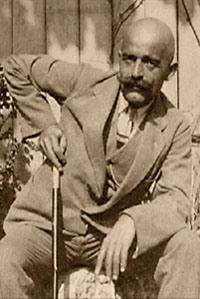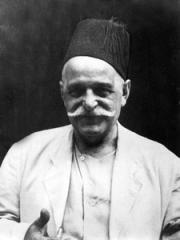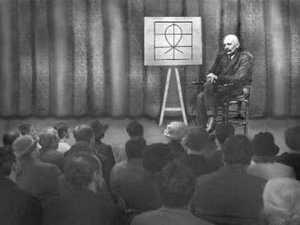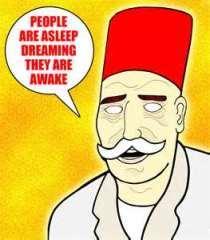 George Ivanovich Gurdjieff (January 13, 1866 – October 29, 1949) rounds out our Section IV. I save him for last because to me he remains an enigma, but still extremely intriguing, and the reason he interests me is not so much his theories as it is the man himself.
George Ivanovich Gurdjieff (January 13, 1866 – October 29, 1949) rounds out our Section IV. I save him for last because to me he remains an enigma, but still extremely intriguing, and the reason he interests me is not so much his theories as it is the man himself.
If you read Beelzebub’s Tales To His Grandson, or maybe I should say, if you can survive it, you know the man is a master story teller, one who is also a great adventurer…if you are to believe what he writes. While Beelzebub is a work of fiction, a gigantic allegorical presentation of his understanding of the history of Man on Earth, Gurdjieff’s works taken as whole is where you discover the man, as well as the philosophy. Together with Beelzebub, Meetings With Remarkable Men (click the links, which are actual links to full .pdf versions of these books, I make no guarantees as to how long these links will last), and Life Is Real Only When “I Am” comprise the “All And Everything” Trilogy. His first book, The Herald of Coming Good, and works by his pupils Ouspensky and the de Hartmanns, further bring to light a resoundingly unique individual.
Not unlike the rest of the people in this section, Gurdjieff’s radically different views have both alienated him, and caused his status as a cult figure. To say his views are controversial is almost an understatement, and if you throw in his alleged personal acts of cunning, including once painting canaries and selling them to unwitting tourists as exotic songbirds, reasoning, if not weaseling his way out of restaurant tabs, his alleged penchant for practical jokes and the affections of the opposite sex, as well as his rumoured 9 kids by several different women, well, you get an idea as to why there is a great divide about this man Gurdjieff.
It’s important to know a little about G.I. the man before getting into his philosophical ideas and, especially for our purposes here, his thoughts on the Origin of Man. He grew up very poor, but very educated, loving books, learning, and truth from an early age. He was also, when young, prone to mischief, and not beyond capitalizing on any foreseen opportunity to make a some quick cash. He was, if you believe his closest pupils, somewhat of a tyrant in his leadership, demanding on his students both psychologically and physically. You would think, with all these questionable characteristics, that there is not much to like here. But let me assure you, like him I do. The reasons are many. Primarily, it is because he appears to be honest. When reporting on his exploits and deeds Gurdjieff doesn’t whitewash any of them. His greatness to me lies in his reporting the truth as he experiences it, even if that truth makes him appear unflattering. By plan or by truth, his telling the truth about his own shortcomings gives the rest of what he says a more believable quality.
Then of course there are his ideas. Any man who talks about most supposed thinkers and scientists as being little more than “parrots” and “wiseacrers,” and who believes that more than “90% of what people believe is bullshit,”  and that ”people are asleep and need to be shaken” is certainly on the right track. Perhaps no thinker has more confounded even his closest disciples, with the possible exception of Friedrich Nietzsche, but Nietzsche had no real disciples until after his death. Only an extremely careful reading of Gurdjieff’s works (“three times,” as he suggests…), along with a study of those who had first-hand knowledge of him, can reveal what these ideas are. A brief look at what has been translated as the “kundabuffer,” as found in Beelzebub, will serve as a good launch pad for a quick presentation of his ideas, especially as they pertain to the Origin of Man.
and that ”people are asleep and need to be shaken” is certainly on the right track. Perhaps no thinker has more confounded even his closest disciples, with the possible exception of Friedrich Nietzsche, but Nietzsche had no real disciples until after his death. Only an extremely careful reading of Gurdjieff’s works (“three times,” as he suggests…), along with a study of those who had first-hand knowledge of him, can reveal what these ideas are. A brief look at what has been translated as the “kundabuffer,” as found in Beelzebub, will serve as a good launch pad for a quick presentation of his ideas, especially as they pertain to the Origin of Man.
a. The Dreaded “Kundabuffer”
Imagine that there was a time when all people worked together, without someone telling them what to do, in fact without even thinking about it. People knew how to act, cooperated as one, and got along for the most part, some normal adversity being necessary for growth. But, in time, trouble was to hit the planet Earth, and the only way these people would survive, and so not all die out from the imminent catastrophe, was to install in them an EGO, or a programming for self-preservation above all things. This ego would serve to, in a way, anaesthetize Man, put him (what was supposed to be) temporarily in a state of trance or type of sleep. Without this “kundabuffer,” a play on the word “kundalini,” which was to be placed in Man’s spinal area, Man would certainly perish. The impending cosmological disaster would throw him into a mad panic, and every single man would otherwise be too concerned with helping others rather than preserving himself. The kundabuffer set in place, Man would now have enough “instinct” for self-preservation, enough ego and putting himself first, to try and keep himself alive, saving the species. It should be noted that this kundabuffer has some history in Gnostic teachings and Gnosticism is one source of Gurdjieff’s ideas.
But after the disaster/catastrophe in the cosmos, in which most on Earth died anyway, it was determined that the kundabuffer was no longer needed. Try as they could, those who placed it in Man (the three-brained Earth creature) found that the kundabuffer, this “devil’s tail,” could not be extricated. It had, as the generations gone by, become part of Man’s formal being. Scientifically speaking, the kundalini, or wisdom serpent, is the genetic code. The “ego” or “concern for self sleep” placed in this code was supposed to be a temporary measure, removed after the threat had passed. But, unfortunately, removing the kundabuffer has proven to be impossible, and so the “sleep” remains to this day a block to the advancement of Mankind as a whole, and to each man (of course, [if you're new here...] and/or woman) as an individual. Now, being self-centered so to speak, we continue to fight wars and cause bloodshed and crimes of all kinds, as too many are blinded, in fact put to sleep about the plights of others. Those who live every day for only themselves do so courtesy of the kundabuffer. What was supposed to be a temporary species-saving device has become rather the source of all vice.
b. The Fourth Way
 The bulk of Gurdjieff’s teachings assume Man in this sorry state of spiritual blindness, and advances methods as to how to wake up from our zombie, or robot-like autonomical state of existence. The Fourth Way, made famous in itself later in a book by that name by Ouspensky, Gurdjieff’s probably best pupil, describes both a course and a way. According to Gurdjieff, and somewhat proven by history, paths to enlightenment for Man have usually taken one of three forms:
The bulk of Gurdjieff’s teachings assume Man in this sorry state of spiritual blindness, and advances methods as to how to wake up from our zombie, or robot-like autonomical state of existence. The Fourth Way, made famous in itself later in a book by that name by Ouspensky, Gurdjieff’s probably best pupil, describes both a course and a way. According to Gurdjieff, and somewhat proven by history, paths to enlightenment for Man have usually taken one of three forms:
1) The Way Of The Fakir
Made prominent by the extraordinary feats of Eastern devotees, the way of the fakir has taken many shapes and forms and still exists today even in the West through things like yoga, breathing exercises, and anything that requires physical control of one’s body. The theory behind fastings, controlling the heartbeat, and rituals of this nature, is that by mastering one’s body and its parts, in this case one’s breathings and type and quantity of food intake, one might come upon greater awareness and spiritual fulfillment. Even today when people do these things irreligously, and for purposes of “health,” it is hoped that by maintaining the body one can be in better position to handle what life bears. Body control is ultimately the way of the fakir, has been and always will be.
2) The Way Of The Yogi
The way of the yogi also takes many forms today, as it was in Gurdjieff’s day, and all through history. Ways to enlightenment, personal growth, and further understanding, which involve somehow mastering or controlling the mind, are the ways of the yogi. Training the mind, focussing one’s attention, meditation for relaxation, stilling the thoughts, even chanting mantras and saying prayers, are examples of attempts at controlling the mind. Mind control is the way of the yogi.
3) The Way Of The Monk
The way of the monk is primarily concerned with getting one’s heart or soul right, that is, correcting one’s behavior to have a clean conscience. When the way involves negotiating right and wrong action, making fair judgments, and being honest with one’s self, spreading love and good cheer, these are affairs of the spirit. The way of the monk is control of the spirit.
For Gurdjieff all these three ways are faulty in the main because they operate separately from one another. There is then for Gurdjieff a Fourth Way, and that way is one which takes into account all three ways. The  way of the fakir, alone, leads nowhere. One can stand on his head for months, or learn to lower his own heart rate to a few beats a minute, but that cannot alone lead to mental or spiritual growth. The way of the yogi, also, is not too beneficial alone. One could conceivably become a master of control over one’s very own thoughts, but if the body is not controlled, and the spirit is unattended, no matter how intelligent a person becomes, or how disciplined of mind he is, he cannot reach his potential. The same, finally, for the mastery over spirit. One could conceivably become adept at doing the right thing in one’s heart, and knowing the right way to act, but without action, and control of the body, or mind control, or a proper plan of action, a fit spirit cannot alone cause one to reach his potential.
way of the fakir, alone, leads nowhere. One can stand on his head for months, or learn to lower his own heart rate to a few beats a minute, but that cannot alone lead to mental or spiritual growth. The way of the yogi, also, is not too beneficial alone. One could conceivably become a master of control over one’s very own thoughts, but if the body is not controlled, and the spirit is unattended, no matter how intelligent a person becomes, or how disciplined of mind he is, he cannot reach his potential. The same, finally, for the mastery over spirit. One could conceivably become adept at doing the right thing in one’s heart, and knowing the right way to act, but without action, and control of the body, or mind control, or a proper plan of action, a fit spirit cannot alone cause one to reach his potential.
Reaching one’s potential, the old adage of Aristotle, is a maxim for Gurdjieff as well. Clearly, for Gurdjieff, people are not equal, but drastically different in strengths and weaknesses, by nature. A man is limited to what he can become by his genetic code and the limitations courtesy of the kundabuffer. Therefore all you can hope to do in this life is make every day a chance to do work, a specific kind of labor on one’s self, to work towards being all you can possibly be. But, he also believes, you can’t do this by any of the ‘old” ways talked about already. You must work not just on your body, or your mind, or your spirit, rather you must work on ALL of them in a balanced way. You are, according to Gurdjieff, a three-brained creature, and each brain is in need of nourishment. You need mental, physical, and spiritual sustenance, and you need more every day, to refine yourself more every day, in order to progress yourself, and earn a place for yourself in the macrocosm of the universe. You must believe in, anticipate, and prepare for a next life.
The Fourth Way combines the teachings of the other three ways as the only way to personal fulfillment. Even this still requires, according to Gurdjieff, teachers. Every day, excepting day of rest, should be used to do work on one’s self, in all three aspects of one’s being, and one should seek out teachers to point them in the right direction. This is known as the “guru” concept.
c) The Gurdjieff School
Music, being somewhat an embodiment of the three parts of the human psyche or soul, stimulating at once the body, the mind, and the spirit, therefore plays a large role in the advanced Gurdjieffian studies. There exist today copies of some of the music for this purpose actually composed by Gurdjieff. Even his music requires concentration, but it always played a part in his school.
It is important to remember that Gurdjieff does not have a high opinion of people en masse. Several times he reports about his own taking advantage of bad human habits, like vanity, to teach those people a lesson, perhaps, or maybe just to provide a counter-weight. For Gurdjieff we are, let me restate it again, mostly asleep, living out our days like automatons. So bad is it that soft words will no longer do the trick to right Man’s ship. No, to reach people today, you have to grab and shake them, until they wake up long enough for you to get something through. Even those of the best attention are often so tainted in their evaluations by the lies they accept as fact – and which pervade their every thought – that even they require repetition and startling to make them able to think afresh, with an open mind, and as individuals.
 I guess one way of explaining the Gurdjieffian approach is to talk a bit about his school. He was a good teacher, almost a cult figure, but one who never took more from his students than what they could afford, financially, mentally, and physically, and who often fed many mouths by his own devices. If a new student came to Gurdjieff from a background of manual labor or menial tasks, he would charge him with keeping the finance books, reading and researching, developing an art, quiet meditation and inaction, or something other than what he was used to. If the person was a piano teacher before, Gurdjieff would have them out in the mud, digging, cleaning, or something of that nature. People who came to him from religious backgrounds were given decidedly irreligious tasks to accomplish. You get the picture. The idea was to take what was being neglected in each individual, whether the spirit, body, or soul, or a combination of two, and bring those aspects or “brains” to the forefront of the new recruit’s life. This was the teaching method, designed to bring to the pupil’s attention the importance of taking care of all the needy aspects of his tripartite human nature.
I guess one way of explaining the Gurdjieffian approach is to talk a bit about his school. He was a good teacher, almost a cult figure, but one who never took more from his students than what they could afford, financially, mentally, and physically, and who often fed many mouths by his own devices. If a new student came to Gurdjieff from a background of manual labor or menial tasks, he would charge him with keeping the finance books, reading and researching, developing an art, quiet meditation and inaction, or something other than what he was used to. If the person was a piano teacher before, Gurdjieff would have them out in the mud, digging, cleaning, or something of that nature. People who came to him from religious backgrounds were given decidedly irreligious tasks to accomplish. You get the picture. The idea was to take what was being neglected in each individual, whether the spirit, body, or soul, or a combination of two, and bring those aspects or “brains” to the forefront of the new recruit’s life. This was the teaching method, designed to bring to the pupil’s attention the importance of taking care of all the needy aspects of his tripartite human nature.
Many debates have raged as to the sources of Gurdjieff’s ideas. He claims to have seen maps and books lost to us today, but which we have to take his word for having ever existing. He was very well read, and often spent his last cents, in his early years, on books he had to have. Definitely his Judaic background comes into play, but more as a rejection of many of the Jewish thoughts and ideas. Gnosticism plays a big part, and in no small measure the religions of the East have found their way into his thought. What I have not seen, but which deserves further study, is his association with Platonic and Aristotelian philosophy. Especially Aristotle rings true often in Gurdjieff’s works, and especially that Aristotelian goal of self-realization, or reaching one’s potential. This philosophical outlook was, by the way, later to be revived in psychology by Maslow, and his pyramids.
Many have drug Gurdjieff through the mud for being everything from a conscious capitalist ready to feed the spiritually hungry people of the world, as did Madame Blavatsky, to an out-and-out charlatan who used his charisma to recruit disciples able to pay his expenses, like any two-bit cult leader. In actuality he was neither of those, and I dare say his voice is refreshing amongst the piles of rabble and unoriginal thought, not unlike the other men we’ve been discussing in this section, and a bit more honest about himself than the rest. He indeed ran a school, a real school where real teaching was going on. That some, who could not handle the lessons, later begrudged Gurdjieff for this or that peculiarity does not deny the truth that those who stood by Gurdjieff have expressed lividly and admiringly about the things they went through under their Master, and acknowledge unilaterally the light he revealed to them.
Compare Gurdjieff to just the great men we’ve discussed in this section. Von Daniken has admitted to fabricating evidence, Velikovsky did not always cite the sources of his beliefs or acknowledge his own prejudices, and Stitchin takes his knowledge of cuneiform and wastes it on fabricated fairy tales and fantastic, unprovable conclusions. These other men are still themselves unique and interesting, worthy of much more mention than they’ve yet received, but in the presence of any work by Gurdjieff, one sees right away a very real difference. This difference is not of mental capacity, but of character. Gurdjieff is not a subject pretending to be objective. The more you study him, you realize Gurdjieff wants objective truth to be his entire subjective outlook – all truth, and little “George Ivanovich Gurdjieff”. It is a refreshing, and utterly human philosophy devoid of prejudices and, despite his own origins and essays to the contrary, a very Christian one. It is true, the allegorical presentation of much of his work, and perhaps all of Beelzebub, exempts him from much criticism. But there is a purpose in the ambiguity of his presentation, and that is to avoid becoming sectarian. I suggest it was truths common to all religions that are the source of his ideas.
d) The Origin and Destiny Of Man
Being well-rounded and balanced is thus the goal, but never one of the three brains to the exclusion of the other. Our goal in life should be to improve ourselves, but not in the normal suggested ways, as in therapy, exercises, mantras, etc. For Gurdjieff, new experiences are mandatory to progress. New impressions from new places, seeing new things, meeting new people, doing things differently, etc., expand your horizons, and allow you to receive new impressions with which to grow. Stimulation of all the senses is therefore an integral part of the Fourth Way, but the need for each individual to find his OWN way is eventually the overriding goal. Perhaps this was the source of many of the reported conflicts with his closest pupils. If you want to follow Gurdjieff that would be fine with Gurdjieff; what must be remembered is that in the end you must even part with Gurdjieff. To really be yourself, you follow masters and lights as far as they can take you, but then it is your duty to stop copying and begin making your own unique way. Balance, authenticity, truth, checking the ego, pushing the boundaries, “devil’s advocacy” – these are all part of the path to authentic self-fulfillment, and put you in a good position for achieving the next life.
But this is not a biography of Gurdjieff, nor a discussion of his thinking in total. Our concern from the beginning here has been to find the true Origin of Man. On this subject Gurdjieff has quite a few things to say. Coming from a family of storytellers, he prided himself on weaving yarns. His books, with Beelzebub as the prototypical example, utilize every means possible to force his readers to give them 100% of their attention: he invents words, combines old ones into new ones, uses roots of several languages, tells his stories on multi-levels, gives his characters and places difficult-to-pronounce names, and more. Indeed, to accomplish this feat of capturing his reader’s undivided attention, and still produce such beautiful and meaty works, is a testament to his genius.
family of storytellers, he prided himself on weaving yarns. His books, with Beelzebub as the prototypical example, utilize every means possible to force his readers to give them 100% of their attention: he invents words, combines old ones into new ones, uses roots of several languages, tells his stories on multi-levels, gives his characters and places difficult-to-pronounce names, and more. Indeed, to accomplish this feat of capturing his reader’s undivided attention, and still produce such beautiful and meaty works, is a testament to his genius.
One difficulty with Gurdjieff, and so difficulty gleaning from him his opinion about the Origin of Man, is that it is often a herculanean task determing what in his works is fact and what fiction. There is one story he tells about being in a desert and weathering a sandstorm by the use of stilts. Stories such as this, with little scientific likelihood, and no evidence other than the word of Gurdjieff, are difficult to interpret. This being said, from what I can glean the Origin of Man for Gurdjieff is ultimately God, as we are from the beginning, as a species and as individuals, potentialities with divine consciousness and spirit. But, it should be pointed out, Man is also in body really just an eating machine, as for Gurdjieff all breathing beings, whether of 1, 2, or 3 brains, have as their purpose consumption and excretion, a necessary process for the continued existence of the world. There is an intricate balance between the mind, body, and spirit of the universe also that must be maintained. As above so below.
In fact, so responsible are we for our progression in all three phases, that if we fail to progress or in fact regress in this required self-improvement, we are sure to face the wrath of “Hasnamuss” who, as the allegory claims, then comes into your consciousness and attracts detrimental things into your life and the lives of those around you. Almost a karmic effect, Hasnamuss can be brought on, for example, if you:
1) engage in “every kind of depravity,” conscious or unconscious
2) get satisfaction from leading others astray
3) are inclined to destroy, or enjoy the destruction of, other breathing creatures
4) get lazy in your improvement, or try to escape from the necessities and duties demanded by nature
5) represent yourself falsely, as what you are not
6) gloat or brag about something that others do not
7) continually head in the wrong direction
and so on.
Of course, Hasnamuss doesn’t need to exist as a discoverable entity in order for us to understand what Gurdjieff means by the concept. In this Hasnamuss also stands as a good example of why G.I. used different sorts of, even crazy, words. Consider that, after a while of repeating a prayer, or mantra, or even the words “I love you” or “thank you,” there usually reaches a point when the words are spoken unconsciously. There is no real mental or spiritual awareness of the sentiment behind the physical words; the attention is likely off somewhere else in the mind. “Do unto others,” “Love thy neighbor,” “Do not bear false witness,” all these catchy Christian phrases, beneficial and correct as written, are still too often repeated and not often enough followed. All these mantras, whether via Christian ideas, or Buddhist ideas, Hindu ideas, and so many more, are present in the works of G.I. Gurdjieff. You can find the soul, the spirit, the will, emotions, even God, too. But none of them will be called by these names. They will be called something different by Gurdjieff, at bottom, to avoid preconceptions.
So, as Gurdjieff has it, we Men are from the beginning animals like the other animals, and without changing our inborn nature we will live and die and the cycle will continue. The saving grace, however, is that Man alone can transcend this condition, actually change his nature, and so in life he is afforded a chance to “Make something of himself.” This passage I’ve found to be a good summary:
In order to more readily understand Gurdjieff’s teaching one must understand Gurdjieff’s view of the ordinary man, which was that the ordinary man, for the most part, was a machine among machines. Man reacts to what acts on him. However, something is wrong with this scenario: Man is just a machine among machines, but a machine which can be free, can be not a machine. From this Gurdjieff concluded that this would not be possible if there were not different levels of existence. On one level of existence man is just a machine existing among machines; but, on another level of existence, there exists the possibility of freedom. Gurdjieff, therefore, concluded that there are two worlds opened to man, both are here, not one far away.
Gurdjieff knew that before man would strive for the second world he must first be aware of it. He was convinced that in order for man to reach the second world, man must first be convinced of the existence of the two worlds and of the complete difference between the existence of the one world and the existence in the other. Gurdjieff’s view of man’s purpose for living more fully described his two-worlds theory. Gurdjieff stated that man has a two-fold purpose for living. The first purpose he must serve whether he wants to or not — in common with every other living being, whether plant, animal or anything else – and this purpose is to serve in the transformation of energy that is required for the whole cosmic economy particularly the economy of our solar system, our earth and our moon.
All living things including human beings, Gurdjieff concluded, are transformers of energy, which is their primary task. But, while men perform this primary task they may choose to also perform on a different level. Some men, in other words, chose to produce or transform a greater amount of energy than is required of them. These men, according to Gurdjieff, seek a different destiny for themselves. Such men have paid their debts; they have produced their required amount of energy and also build up a surplus for themselves.
To be understood, there are two different viewpoints possessed here. The man who just does what is required of him usually thinks something like this, “This is all I can expect out of life; and all that life can expect from me.” This is an expression of no incentive; while a proper response would be a try to make efforts, struggle to raise himself above this level of mechanical existence, to lift himself out of this causal mechanism. The man possessing the second attitude changes himself into a free and independent being who does things that he deems necessary to do. The latter is the response of the man who works on himself, as Gurdjieff phrased it.
This is the man, according to Gurdjieff’s judgment, that rightfully chooses between life and death. The life is not an imaginary life in some far-off heaven, but rather a full and functional life on earth that contributes to the cosmic economy; and the death is not a death in a fiery hell, but the death of an unproductive life-or the death of the “man machine” that Gurdjieff termed him. The one who seeks life, Gurdjieff contended, is the man who finds that he has latent powers to perfect himself. These latent or additional powers are not confined just to his ordinary life; but rather with them the man discovers that he not only can do what is required of him in his ordinary life but also can produce a surplus of energy that enriches his life and the lives of others. However, at the present time, which is readily observed, there is far too small of a proportion of men that are seeking to improve their lives, or seeking a second destiny. The consequences of this are not good, because the amount of energy or matter that has to be produced in the life of man is not determined by man himself, but by general influences. As individual production decreases world population must increase to maintain production. This is, at present, analogous to herds of sheep, when sheep produce less wool the number of sheep must be increased in order to meet the same requirement for wool. The analogy summarizes Gurdjieff’s simplified and concentrated message: only by the unremitting struggle of the individual for his self-perfecting can a force be created which will change the world. Without this the world will continue in an unproductive state, living off of itself.
Simply stated, far too many persons are just aware of their first world or destiny, as Gurdjieff contended. They reside in a static state of unconsciousness. In order to break out of this state Gurdjieff also held that people had to study under persons who already had escaped from their own robotic existences: a teacher, a Man Who Knows. Such people must form groups or schools where they have to obey all of the rules, including the obligation to tell the teacher everything, to keep silent in front of others, and to be prepared for the teacher to lie for the “good” of the students. The students had to achieve self-realization through work on themselves, self-observation, and self-remembering – conscious awareness of their surroundings ‘and’ self in the situation (source here, my emphasis).
Because of the aforementioned kundabuffer, Man is by nature out for himself, and so his spirituality has been corrupted. The mistake was made by those who thought they were doing good, without God’s permission, instilling into Man this kundabuffer. Because of this mistake Man has a long hard road, but one that is not impossible to achieve. Gurdjieff, though, makes clear the sad reality that over 90% of people will not be able to overcome their therefore inborn shortcomings. Through no fault of their own, Men have been cursed, and it is only by a type of grace that they have any chance at all of escape. The kundabuffer manifests in Man as a type of sleep, keeping them unaware of what is really going on around them. As stated before, this was meant to be a protection from panic and to instill a penchant for self-preservation. Now that it cannot be removed, Man must work to awaken.
This work is done by feeding each of the three hungry aspects of one’s being equally. You cannot become a bookworm and ignore your body, nor work your body without strengthening your mind. And, of course, both mind and body must give equal time to the strengthening and expansion of the spirit. Any imbalance is undesirable. Most people live their lives as the sheep, going as goes the herd, which surely means they will be fleeced and eventually used for food like the other sheep. One can reverse this direction by beginning to question everything and not be led blindly by the forces of life and society.
and body must give equal time to the strengthening and expansion of the spirit. Any imbalance is undesirable. Most people live their lives as the sheep, going as goes the herd, which surely means they will be fleeced and eventually used for food like the other sheep. One can reverse this direction by beginning to question everything and not be led blindly by the forces of life and society.
As Gurdjieff says in Beelzebub:
Although the solar system Ors had been neglected because of its remoteness from the Center and for many other reasons, the Most Holy Cosmic Individuals surrounding our Common Father Endlessness had sent Messengers from time to time to the planets of this solar system, to regulate more or less the process of existence of the three-brained beings arising there, and to bring it into accord with the general world harmony.
Man, then, arises normally on certain planets, a product of the general Creation plan. While I disagree with Gurdjieff about the existence of humans, or three-brained beings, anywhere else, his theory is consistent throughout and postulates many worlds all a product of the same Creation. Each planet in the universe with life see that life evolve to a certain plan, and as this passage shows, periodically “angels,” or messengers appear to check on the progress of these creatures. Sometimes these high messengers bring with them bits of technology to advance the species, like agriculture and metallurgy. It seems we Earthly three-brained beings are an anomaly in the universe. We require special attention, being victims of unforeseen circumstances.
Gurdjieff is my favorite thinker right now for several reasons. Although I disagree with many of his ideas, he is, in a word, refreshing. He has all the esoteric knowledge of a Blavatsky without all the baggage and obvious dishonesty. I am a fan of Blavatsky more because of her attitude and scope of knowledge than her academic honesty, which I do not trust. I can do without channelling and things of that nature, as frankly I don’t see the need for why it should even be desired, let alone possible. With Gurdjieff, you can almost feel the mastery of world religions and esoteric knowledge he possessed, but at no time does he ever allude to anything beyond the scope of possibility. Sure, I think we must retain a bit of skepticism when we consider especially his own personal exploits, and when he alludes to things like maps no one else has ever seen, but we cannot for a moment discount the work he has done. His pupil Ouspensky made the Fourth Way into an at one time trendy self-help book. The original, in thought and justification, can only be found in the Master Gurdjieff, and anyone who really wants to give themselves a test, and learn about the real Fourth Way, can only do so by reading Gurdjieff himself.
This concludes our Section IV. I’ll follow up with a quick recap, of what we’ve done so far, in Section V. Let’s see how far we’ve progressed in finding out the Origin of Man.
